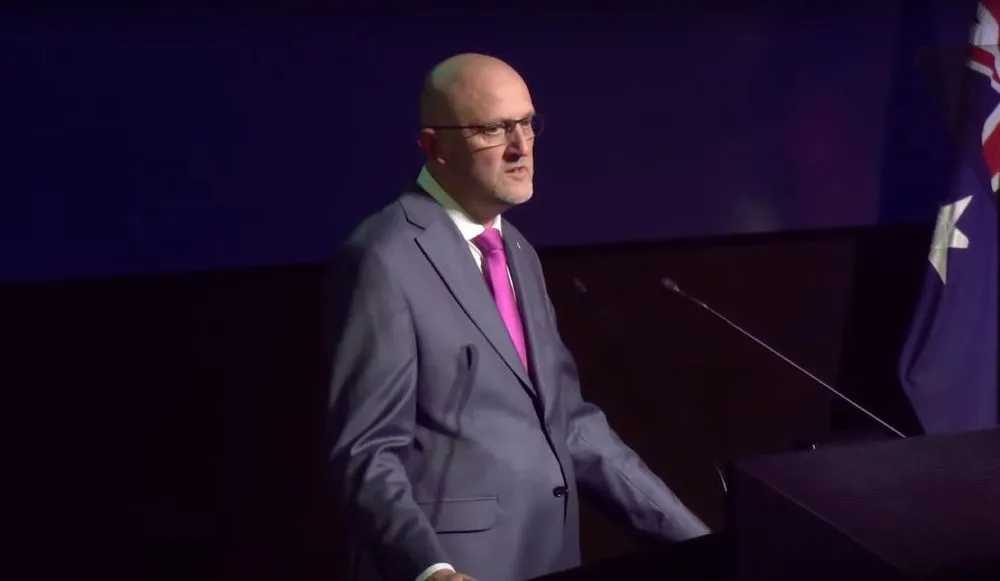Espionage costing Australia $8 billion each year, warns intelligence chief
Foreign states stealing secret information from Australia are costing the country about $8 billion a year according to the head of the country’s domestic security service.
Mike Burgess, who leads the Australian Security Intelligence Organisation, said at the Annual Hawke Lecture at the University of South Australia that he was putting a dollar figure on the economic cost of espionage for the first time to stress the “real, present and costly danger” facing Australia.
Burgess shared case studies in which foreign nationals had tricked or compromised Australians into accessing sensitive locations and computer networks and used the pilfered information they then stole to pursue their country’s own strategic advantage.
The ASIO chief also disclosed that his agency had disrupted 24 significant espionage and foreign interference operations over the past three years — “more than the previous eight years combined” — and that these were “just the major disruptions; there have been many other cases.”
Behind the threat from espionage was a “new iteration of great power competition,” which Burgess said was “driving a relentless hunger for strategic advantage and an insatiable appetite for inside information.”
Foreign intelligence services were obtaining this advantage both by “convincing, coercing or seducing insiders to impart sensitive information — and through technology, most commonly by hacking,” said Burgess, adding that was often a combination of both.
The spies targeting Australian secrets have been “masquerading as diplomats, journalists, academics, businesspeople and other professionals to conduct sophisticated, multi-year campaigns” as well as opportunistically snatching material when it’s available.
Alongside China, Russia and Iran — which the ASIO chief had previously named — “many other countries are also targeting anyone and anything that could give them a strategic or tactical advantage, including sensitive but unclassified information,” he said, adding that Australians would be “shocked” by the number of other countries also engaged in espionage.
The $8 billion figure ($12.5 billion AUD) was calculated by ASIO in partnership with the Australian Institute of Criminology for a special report. Burgess described it as a deliberately conservative estimate and the report as “the first and certainly most comprehensive public analysis of its kind in the world.”
It used the narrow definition of espionage as only referring to information stolen by or for a foreign government, and counted “the direct costs of known espionage incidents, such as the state-sponsored theft of intellectual property, as well as the indirect costs of countering and responding.”
The study estimates that foreign cyber spies alone stole nearly $2 billion AUD worth of trade secrets and intellectual property from Australian companies and businesses between 2023 and 2024.
“The report includes a case study where spies hacked into the computer network of a major Australian exporter, making off with commercially sensitive information. The theft gave the foreign country a significant advantage in subsequent contract negotiations, costing Australia hundreds of millions of dollars,” Burgess said.
In-person acts of espionage have included a delegation from overseas visiting a sensitive horticultural facility in an official tour. One member of the delegation peeled away from the main group to enter a restricted area, where they “photographed a rare and valuable variety of fruit tree,” said Burgess.
“An alert staff member discovered and deleted the images but it later emerged photos weren’t the only things taken that day — several of the tree’s branches were missing. The delegate had snapped them off and smuggled them out of Australia. Almost certainly, the stolen plant material allowed scientists in the other country to reverse engineer and replicate two decades of Australian research and development.”
Alongside the economic cost, Burgess warned “many of the most serious, significant and cascading costs of espionage are not included in the $12.5 billion [AUD] figure. The potential loss of strategic advantage, sovereign decision-making and warfighting capacity hold immense value, but not a quantifiable dollar value.”
The ASIO chief also warned that foreign spies were taking a “very unhealthy interest” in the capabilities of the AUKUS pact, noting how defence employees travelling overseas have been subjected to cover room searchers and been approached at conferences by disguised spies, and given gifts containing surveillance devices.
“Thousands of Australian students, academics, politicians, businesspeople, researchers, law enforcement officials and public servants at all levels of government have been targeted for espionage in this way. The vast majority resist, report or ignore the approaches. Unfortunately, though, some are sucked in and end up being used — recklessly or consciously — to gather information for a foreign country,” he said.
The threat “is serious, but not insurmountable. The people conducting espionage are sophisticated, but not unstoppable. We cannot be defeatist or insecure about our security. We can and should have confidence in our ability to respond,” added the ASIO chief. “While we can and should keep counting the cost of espionage, the value of countering it is priceless.”
Alexander Martin
is the UK Editor for Recorded Future News. He was previously a technology reporter for Sky News and a fellow at the European Cyber Conflict Research Initiative, now Virtual Routes. He can be reached securely using Signal on: AlexanderMartin.79



